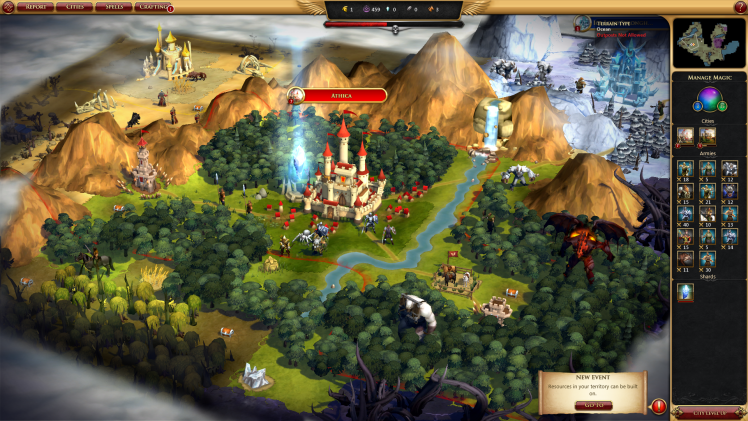Check out our Reviews Vault for past game reviews.
Sorcerer King forces you to create turn-based strategy in a scenario where you’ve already lost. The world slides into the arms of an evil magic-wielder, with horrible monsters roaming the countryside, and you step in with a town, a spell, a champion, and a few supporting fighters.
Even the bad guy, the Sorcerer King in the title, assumes you’re his minion and that all is well in his total domination of the landscape.
Unlike a traditional 4X strategy game, you’re not just looking to eXplore, eXpand, eXploit, and eXterminate. You’re trying to survive against odds stacked high against you, using the abilities of your fighters, your city, and your own spells to yank success from the maw of failure.
You’ll work to find allies, protect the magic crystals that dot the landscape and form the last line of defense against the evil Sorcerer King, and figure out how to destroy enemies three times your size and power.
It sounds grim. But thanks to a healthy dose of humor, some nifty spells and abilities, and big rewards for smart strategy, Sorcerer King manages to engage you from the start.
A successor to the Fallen Enchantress games (and better than most of them), Sorcerer King also comes from publisher/developer Stardock. It’s available now for Windows PC for $40.
What you’ll like
The humorous quests
Questing in Sorcerer King is definitely the best part. Quests trigger when you enter a spot on the landscape with an NPC building of one type or another.
Generally, quests take the form of a setup — always a funny one — plus a few options. Depending on what option you choose, the rewards change, and some lead to combat or a second location for looting or fighting. Stardock hired Chris Bucholtz, who composes funny stuff on Cracked, to write for Sorcerer King. Many of the quests will make you guffaw.
Sorcerer King fans did a pile of the (paid) programming to get hundreds of quests into the game from December through January, as part of an unusual arrangement with Stardock. Bless them for it: The quests add immensely to the game’s entertainment.
You come upon a murder in an inn, for example. Your options include resolving to find the murderer — or resolving to find a safer inn. When you confront the traveling salesperson everyone agrees did it, he admits that he does black out and wake up covered in blood. Note: He says “covered in blood.”
Many quest rewards include convincing random people to join up with your party. Between that factor and the incredible Hypnotism sovereign ability, I ended up with armies that included History Enthusiasts, Stable Boys, Former Roughs, a Troup of Bards, a Sorcerer King toady, a Former Fortune Teller, a Lazy Census Worker, a Reckless Mayor’s Son, ogres, barbarians, spiders … all much more interesting than the game’s stock units, though they their abilities often mimic them.
The RPG elements
Your tiny characters level up as you fight with them, and you’ll find materials to make them gear (and upgrade it) as well as add abilities to their battle arsenal.
The result is an RPG flavor for a strategy game, which adds depth to the fights and fun for the player. You can walk into a conflict where you have one tiny unit against a field of powerful brutes, and walk out a winner — if you smartly use the unit’s leveled-up abilities and talent tree, your own sovereign abilities gained over time, and the items you’ve crafted and equipped or stashed away in inventory.
Playing battles all the way through
Typically, I start strategy games playing battles to their conclusions. Then as the game goes on and combat becomes repetitive, I start auto-resolving fights. Then I get bored, and it doesn’t matter how close things are, I’m clicking the auto-battle button as soon as it comes up.
Not so here.
Sorcerer King does a fine job of auto-resolving conflicts. But playing them is surprisingly rewarding, to the point that even after dozens of hours of play, I was still running most battles hands-on. Some of that was the variety of champion skills (more on that in a minute), but a lot of it was just how much impact combat strategy created on the tiny battlefield grids.
I’m especially a sucker for Hypnotism (and Tame, and to a lesser extent Dominate) as sovereign abilities you can pull out during close battles. The first two give you the opportunity to win some of the most powerful monsters in the game to your side –- an almost irresistible mechanic.
The replay value
Sorcerer King generates factions and what you’ll find on the maps randomly. Combine that with the varying sovereigns you play (each of whom has different units and starting parties) and the variety of what spells you choose or how you customize your sovereign at the beginning, and you can create a very different-feeling game from any you’ve played before.
Even the bad guy’s progress on the doomsday meter, which adds an element of urgency to the game as a whole, appears to be affected by the random generation, due to the opposition he faces (or not) from the factions he encounters. Some games, the meter creeps; in others, it flies.
Each game feels completely different.
Your powerful champions
You start the game with a champion (which you can select as part of picking the first starting party), and their abilities add fascinating dimensions to the battlefield. You can auto-resolve battles, but they engage you when they are at all even – and sometimes when they’re not, especially if you have Hypnotism in your back pocket and are hunting for allies.







